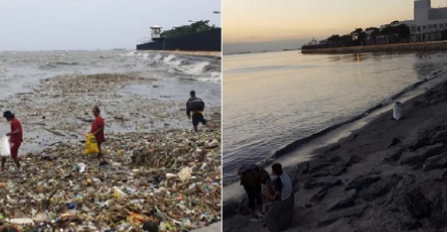 The images below highlight the dramatic results earlier this year in the Philippines, when over 45 tonnes of plastic and rubbish were collected off a beach in Manila Bay.
The images below highlight the dramatic results earlier this year in the Philippines, when over 45 tonnes of plastic and rubbish were collected off a beach in Manila Bay.Plastic Bank and Bounties Network have been encouraging people to collect rubbish and plastic and rewarding the collectors by paying them in Ethereum (a Cryptocurrency). These two companies then partnered with a local Philippine cryptocurrency firm, which itself took the Ethereum and converted it into the Philippine peso.
SC Johnson, the makers of Raid, Pledge, Kiwi, Glade, etc, has been involved in a number of projects in Indonesia, where it has been giving away Digital currencies in exchange for local villages to collect plastic waste. According to a press release, SC Johnson teamed up with Plastic Bank to establish eight plastic recycling centres and is giving Digital tokens as an incentive to pick up rubbish off their local beaches, as “people can then use the tokens to buy needed goods and services – reducing the risk of loss or theft”.
These are great examples of how Digital Assets are being used to encourage positive behaviour and help reduce the amount of rubbish in our communities. This could not be further from how some people few Cryptocurrencies being the preserve of drug lords, terrorists, and generally unsavoury characters.
A little closer to home, in 2017, the Hull Coin was launched. Whilst it cannot be bought, it can be earned by doing “good work” for Hull’s local community and then spent in local shops to receive a discount. Other towns in the UK have also looked at issuing local currencies, but as yet we have not seen widespread adoption.


